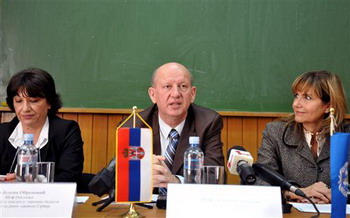- Serbia
Get to know Serbia
- Citizens
Culture and science
Health services
Pension and disability insurance
- Business
Employment
Economy
- Media
- Government
- Contact
Keep in touch
Contact form
Back
Keepin touch
Whether you have a question, comment, suggestion or any problem in the purview of the government, send us your message and we will try to respond as soon as possible. If your problem is not in our purview, we will forward your message to the relevant institution.
Q:
A:
Misuse of antibiotics a health risk
Belgrade,
7 April 2011
Minister of Health Zoran Stankovic stated today that frequent and inadequate use of antibiotics increases health care risks.
Speaking at a press conference on the occasion of 7 April, World Health Day, which is this year marked under the slogan “Antimicrobial Resistance: No Action Today, No Cure Tomorrow”, Stankovic said that this issue poses a risk to health care at both the local and global levels.
Head of the World Health Organisation Office to Serbia Dorit Nitsan-Kaluski stressed that antimicrobial resistance is a problem that has to be resolved by all health professionals, including pharmacists.
This also includes veterinarians and animal specialists who administer antibiotics to their livestock believing it will help them to grow better.
If uncontrollable use of antibiotics continues, we will also eradicate the good bacteria from our organisms, she warned.
A representative from Dr Milan Jovanovic Batut Public Health Institute Jelena Obrenovic announced that a new rulebook is being drafted to tackle the issue of hospital infections, including the proper use of antibiotics.
Antimicrobial resistance is a consequence of use, and especially of misuse of antimicrobial medications, and it appears when a microorganism mutates or acquires resistance genes.
Resistant microorganisms can be transferred between humans, animals or in the living environment, and the transfer of bacteria or genes, containing the data on resistance, can take place in hospitals, in a community, through the food chain and in the environment.
The number of deaths in Europe has already rocketed to 25,000 annually, while the costs have jumped by €15 billion due to treatments of infections caused by resistant agents.
The latest data affirm that the number of patients infected with antibiotic resistant bacteria is on the rise and that antimicrobial resistance is an immense threat to public health.
Head of the World Health Organisation Office to Serbia Dorit Nitsan-Kaluski stressed that antimicrobial resistance is a problem that has to be resolved by all health professionals, including pharmacists.
This also includes veterinarians and animal specialists who administer antibiotics to their livestock believing it will help them to grow better.
If uncontrollable use of antibiotics continues, we will also eradicate the good bacteria from our organisms, she warned.
A representative from Dr Milan Jovanovic Batut Public Health Institute Jelena Obrenovic announced that a new rulebook is being drafted to tackle the issue of hospital infections, including the proper use of antibiotics.
Antimicrobial resistance is a consequence of use, and especially of misuse of antimicrobial medications, and it appears when a microorganism mutates or acquires resistance genes.
Resistant microorganisms can be transferred between humans, animals or in the living environment, and the transfer of bacteria or genes, containing the data on resistance, can take place in hospitals, in a community, through the food chain and in the environment.
The number of deaths in Europe has already rocketed to 25,000 annually, while the costs have jumped by €15 billion due to treatments of infections caused by resistant agents.
The latest data affirm that the number of patients infected with antibiotic resistant bacteria is on the rise and that antimicrobial resistance is an immense threat to public health.
-
 Belgrade, 22 January 2025
Belgrade, 22 January 2025Egypt one of Serbia’s closest partners on international stage
-
 Belgrade, 9 July 2024
Belgrade, 9 July 2024Support for 104 associations in diaspora that preserve Serbian language, culture
-
 Belgrade, 15 April 2024
Belgrade, 15 April 2024Competition for StarTech grants open until 31 May
-
 Belgrade, 2 October 2023
Belgrade, 2 October 2023Serbia respects Resolution 1244 and will do everything to preserve peace
-
 Belgrade, 13 September 2023
Belgrade, 13 September 2023Day of Serbian Unity to be celebrated outside borders of Serbia, Republika Srpska for the first time
-
 Belgrade, 8 August 2023
Belgrade, 8 August 2023RSD 24.2m in state aid paid out to citizens affected by storm
-
 Belgrade, 17 June 2023
Belgrade, 17 June 2023Belgrade is doing everything to preserve peace in Kosovo and Metohija
-
 Belgrade, 15 June 2023
Belgrade, 15 June 2023Slovenia will continue to support Serbia on its way to EU
-
 Belgrade, 5 May 2023
Belgrade, 5 May 2023Emergency measures, tightening of conditions for possessing weapons
-
 Belgrade, 3 May 2023
Belgrade, 3 May 2023Three days of mourning in Serbia over tragedy at Vladislav Ribnikar primary school

